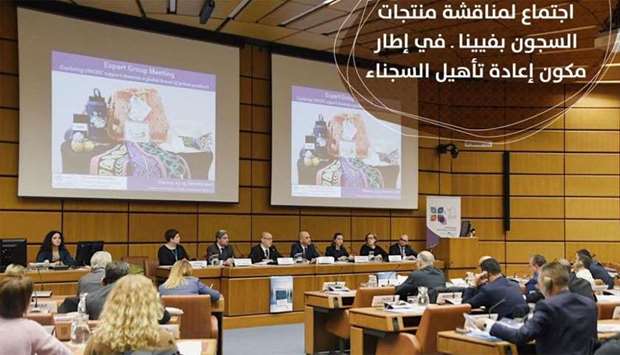* UNODC to review achievements of the World Programme for the Doha Declaration in New York on Tuesday
The Doha Declaration 2015, adopted at the end of the 13th United Nations Congress on Crime Prevention and Criminal Justice (UNCCPCJ), affirms Qatar's “commitment to supporting international co-operation in the service of peace and stability”.
The 13th UNCCPCJ was held in Qatar in April 2015, and the Doha Declaration 2015 is one of the largest programmes implemented together by a country and the UN.
The United Nations Office on Drugs and Crime (UNODC) is set to review the achievements of the World Programme for the Doha Declaration at a special event in New York today, focusing on the efforts to achieve the goals of its main initiative - Education for Justice.
The meet will also discuss the value of education as a source of security from drugs, crime and terrorism, and as a major contributor to the rule of law through change and modernisation, according to a statement issued in Doha by the Ministry of Interior.
The event will be addressed by HE Sheikha Alya bint Ahmed bin Saif al-Thani, Permanent Representative of Qatar to the United Nations; Major-General Abdullah Yusuf al-Mal, adviser to HE the Minister of Interior and chairman of the Follow-up Committee for the World Programme for the Doha Declaration; and Yury Fedotov, executive director of UNODC.

Experts' meet on judicial integrity
“Qatar provides the largest support in the history of the UNODC by any State, which has been effectively reflected in the development and promotion of policies in various areas,” the statement points out. “It has contributed to addressing crime, transnational organised crime and new crimes, especially in cybersecurity, and has a positive impact on international peace and security.”
As a result of the multiple activities in line with the Doha Declaration programmes, "clear and concrete achievements" were made during 2015-2018 based on its four components - Judicial Integrity, Prisoner Rehabilitation, Youth Crime Prevention through Sports and Education for Justice (E4J), the statement explained.
* Judicial integrity: Based on UNODC's extensive expertise in assisting member states in these areas, the Judicial Integrity component aims to assist judicial institutions in promoting judicial integrity and fighting corruption in the justice system in accordance with Article 11 of the United Nations Convention against Corruption.
Since the adoption of the declaration in 2015 until September 2018, the total beneficiaries in this area amounted to 5,769 in 186 countries, including 4,162 in the field of awareness and knowledge activities and 1,607 in the field of capacity building.
The most prominent initiative was the launch of the Global Citizenship Initiative for the Learning of Legal Cultures, which was signed in partnership between the United Nations Office for the Implementation of the Doha Declaration and Unesco, aimed at strengthening the principles of human rights, democracy and the rule of law.
During this period, many workshops have been organised and a number of articles on judicial integrity by law experts published.
* Education for Justice: Since the adoption of the declaration in 2015, the programme has benefited 8,329 beneficiaries in more than 166 countries, including 4,862 in terms of awareness and education activities and its various initiatives, and 3,467 in terms of technical support.
The UNODC and Unesco, in line with this component, have carried out a number of initiatives aimed at developing a set of guidance and educational materials to strengthen education systems as well as the capacity of policy makers and teachers to plan and implement educational activities that address the causes and motives underlying unlawful behaviour. It is mainly intended to achieve a more peaceful and tolerant society, which will address violence, crime and corruption in accordance with the 2030 Sustainable Development Plan, particularly goals 4 and 16, which involve good education, peace-building, justice and strong institutions.
The programme has also developed a game that can be played to strengthen girls to confront violence against women, one of the most innovative projects meant for the rapid realisation of the human endeavour through which it is achieved.
* Prisoner rehabilitation: It aims to prepare prisoners for post-release and successful integration into the community through prison programmes and post-release support programmes. Within this component, many constructive rehabilitation programmes are being implemented based on the Doha Declaration.
Experts have agreed that the first steps of community reform for a prisoner would be through social reintegration and in line with principles of Nelson Mandela, as well as by expanding co-operation with international organisations dealing with social dimensions and social responsibility. The total number of beneficiaries of prisoner rehabilitation has reached 904 people in 64 countries so far.
The Prisoner Rehabilitation programmes include education, vocational training and technical guidance on how to strengthen prison-based work programmes, including a roadmap for the development of prison-based rehabilitation programmes. A number of countries have engaged with this component in various forms. Algeria gives training certificates to graduates trained in prison with no mention of their issuance by the prison. In addition, the marketing of prison products has been opened in Paraguay and other countries.
* Youth crime prevention through sports: This initiative aims to support the growth of the youth to contribute positively to society by deploying sports activities to provide a positive experience and support their health development.
The number of beneficiaries of this component has so far reached some 6,466 in more than 28 countries. The last activities carried out during 2018 were the implementation of “training courses for trainers” for 150 trainers in order to transfer their training knowledge to another 1,000 people. This was launched in South Africa, Kazakhstan and Brazil.
The UNODC has also developed programmes by involving young people and children with basic life skills that have proven to strengthen their steadfastness against crime, violence and drug abuse through joint programmes that deal with psychological and emotional stress, and teach them to refine their critical thinking and problem solving.

